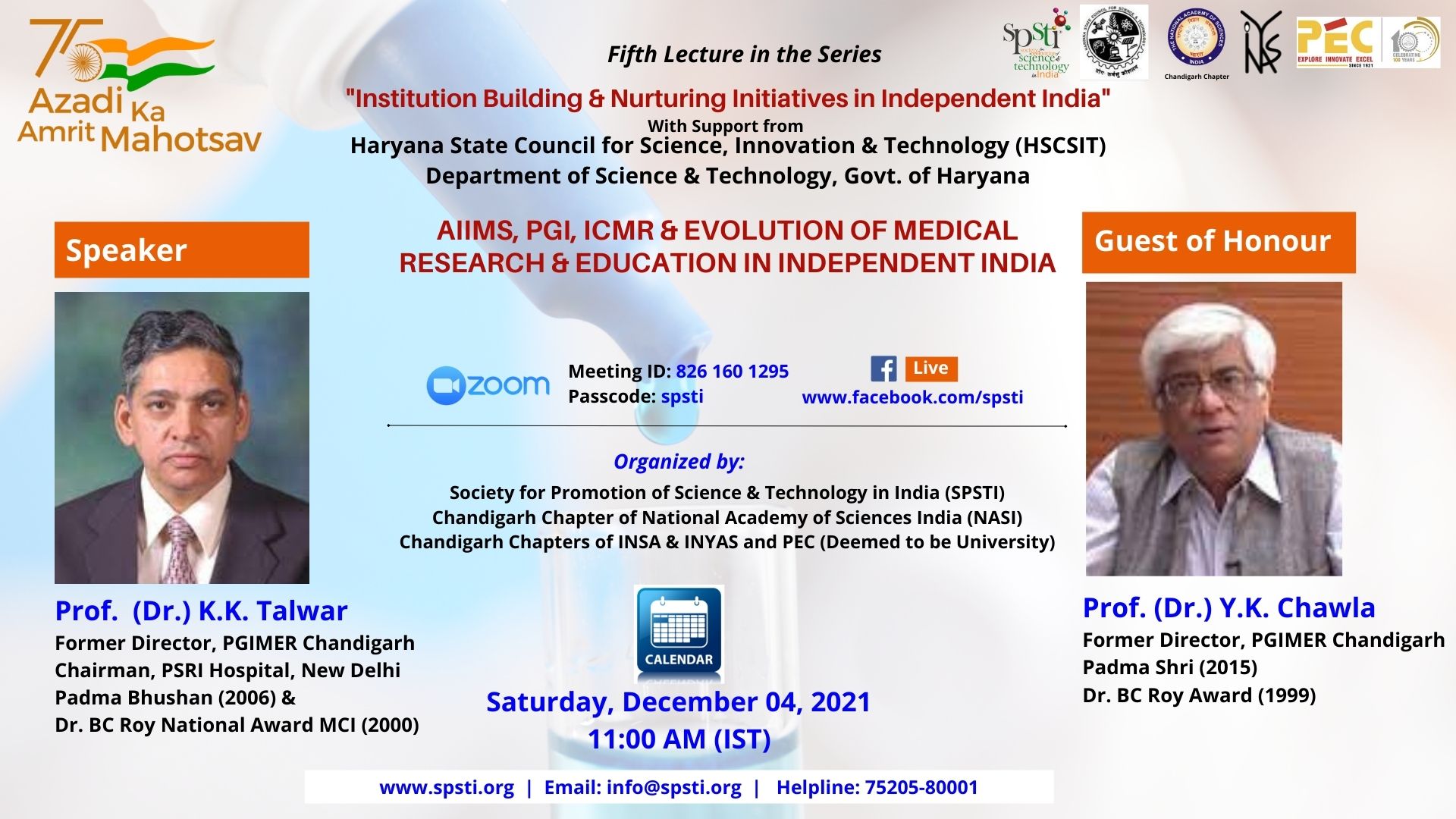The Society for Promotion of Science of Science & Technology in India (SPSTI), with Chandigarh Chapter of the National Academy of Sciences India (NASI) and Chandigarh chapters of INSA & INYAS in association with Punjab Engineering College (PEC) (Deemed to be University),Chandigarh with support from Haryana State Council for Science, Innovation & Technology (HSCSIT), DST, Govt. of Haryana organized the fifth lecture of the Eighteen part Lecture series devoted to ‘Institution Building & Nurturing Initiative in Independent India’ to commemorate Azadi ka Amrut Mahotsava. The lecture entitled “AIIMS, PGI, ICMR and Evolution of Medical Education & Research in Independent India” was delivered by Prof. (Dr.) K. K. Talwar, former Director, PGIMER, Chandigarh on December 04, 2021 at 11.00 am through online mode. The session was attended online on zoom and many more viewed the same on the Facebook page of SPSTI.
The session was steered by Prof. Keya Dharamvir, General Secretary, SPSTI, who welcomed all. The opening remarks were given by Shri Dharam Vir, IAS (Retd.), the President of SPSTI. Prof. Arun Kumar Grover, Former Vice Chancellor of Panjab University and Vice President of SPSTI gave brief introduction about the series. Dr. Meenu Singh, Telemedicine, PGIMER introduced the Guest of Honour, Padma Shri Prof. Y. K. Chawla, Former Director, PGIMER, Chandigarh and has been awarded Dr. B C Roy Award in 1999. He said out of 4580 medical institutes only 25 have more than 100 papers in a year and 58% medical colleges do not have any publication owing to lack of infrastructure and lack of mentors to motivate to do research. Basic scientists work in their silos which need to be broken and work in association with clinicians for finding the solutions to the problems. .
The speaker Prof. Prof. (Dr.) K. K. Talwar was introduced by Prof. Sameer Malhotra, PGIMER. Prof. Talwar was Former Director, PGIMER Chandigarh and Chairman, PSRI Hospital, New Delhi. He has been awarded with Padma Bhushan in 2006 and Dr. B C Roy National Award MCI in 2000. His lecture was journey of his experience in the PGIMER and AIIMS. He shared AIIMS was vision of late Prime minister Pt. Jawaharlal Nehru and the health minister Smt. Raj Kumar Amrit Kaur. It was recommended by the Bhore Committee, chaired by Sir Joseph Bhore, that the country should have a National Medical Centre. Initially the institution was to be set up at Calcutta but Dr. B. C. Roy declined and finally it was set up in Delhi. The objective was to create an institution with act of Parliament to serve as a nucleus for nurturing excellence and medical education, health care and research. As an autonomous body the Director had the power to take decisions for growth of institution.
The concept of building PGI on pattern of AIIMS was vision of the then Chief minister of combined Punjab and in 1960. PGIMER was established in 1962 with Tulsi Das as it first Director.
He share in 1964-65, Government of India approached Osmania Medical College, Government of Andhra Pradesh to make it another Institute of Excellence under the Act of Parliament. The Chief Minister of Andhra Pradesh thought of it as losing their control on their institution. Prof. Kairon noticed this and approached Government of India to make PGIMER another Institution of Excellence under Act of Parliament, instead of resistance from some of his officers. In initial years of both the institutions eminent professional from abroad and the country were invited to head various departments and their dedication, commitment and vision for development laid the foundation for the various specialities and super-specialities. Innovative steps and ideas were adopted under the strength of autonomy to build the institutions. The Director was given complete power to recruit the best faculty and could use his discretion to recruit most competent faculty. The passion and commitment of senior and founder members developed a culture of punctuality, hard work, patience, research oriented and ethical practices in pursuit of excellence in the subject of specialisation.
He shared the publication these institution have produced has quality far below standard and not worth publishing. This is concern and we need to promote original research. Among the most cited articles more than 80% had first or corresponding author from outside India. He said there is need to improve infrastructure, create enabling environment, incentive for research and a close physician-scientist interaction is very important to promote translational medical research. He shared government interference in the autonomy of these institutions is one of the major challenge faced by these institutions. OPD and patient load is another challenge that leaves physicians with less time to think for medical research.
He concluded his stating the institutions have lived and justified the vision of their great founders. But we need to keep on making efforts to maintain and ensure their growth and it is only this way that we can look forward the global need in medicine and need to grow like famous institutions abroad.
The session was much appreciated by the audience and followed with questions. The information about future lectures in the series will be available on the SPSTI webpage and lectures can be accessed on the SPSTI Facebook page

